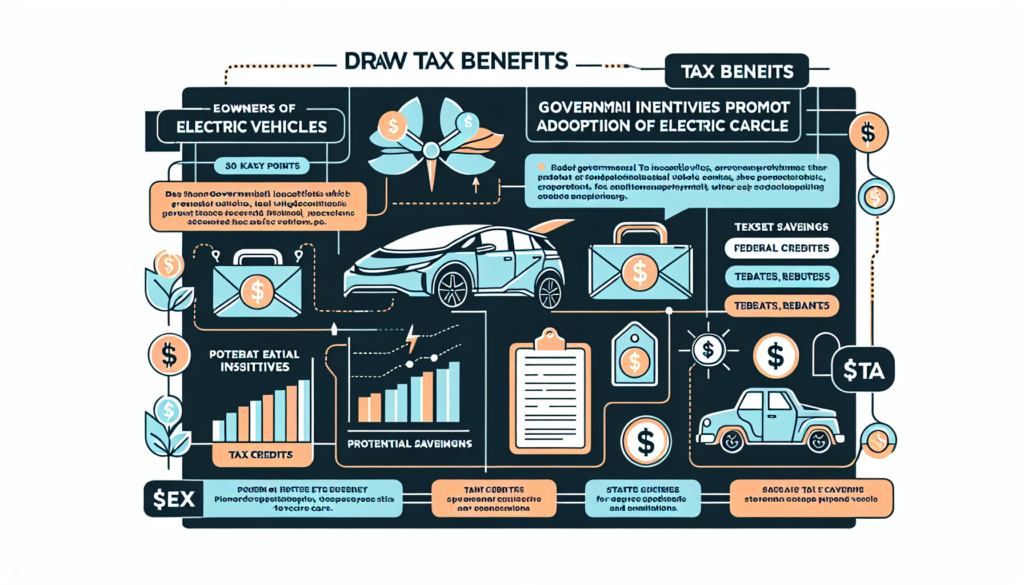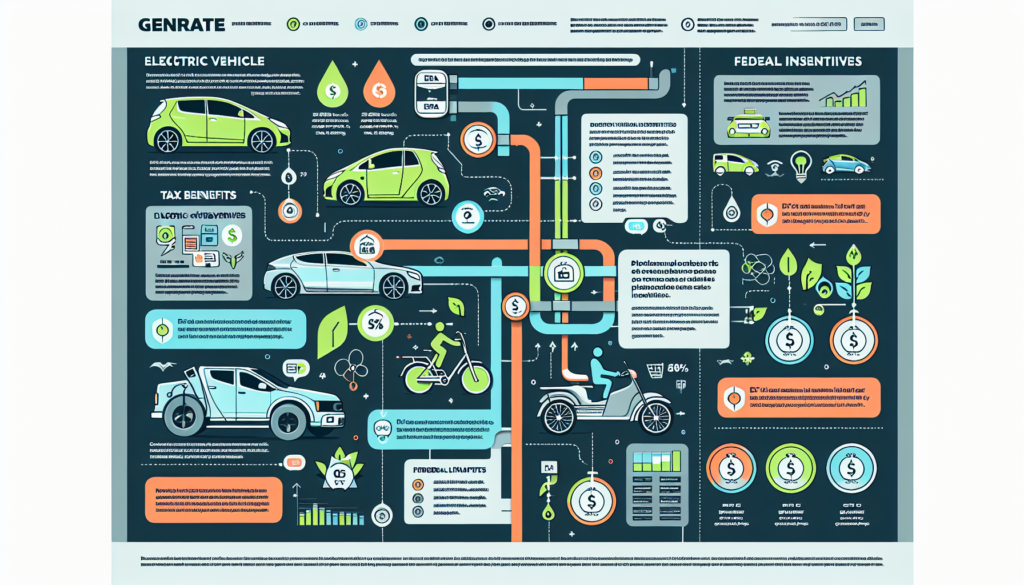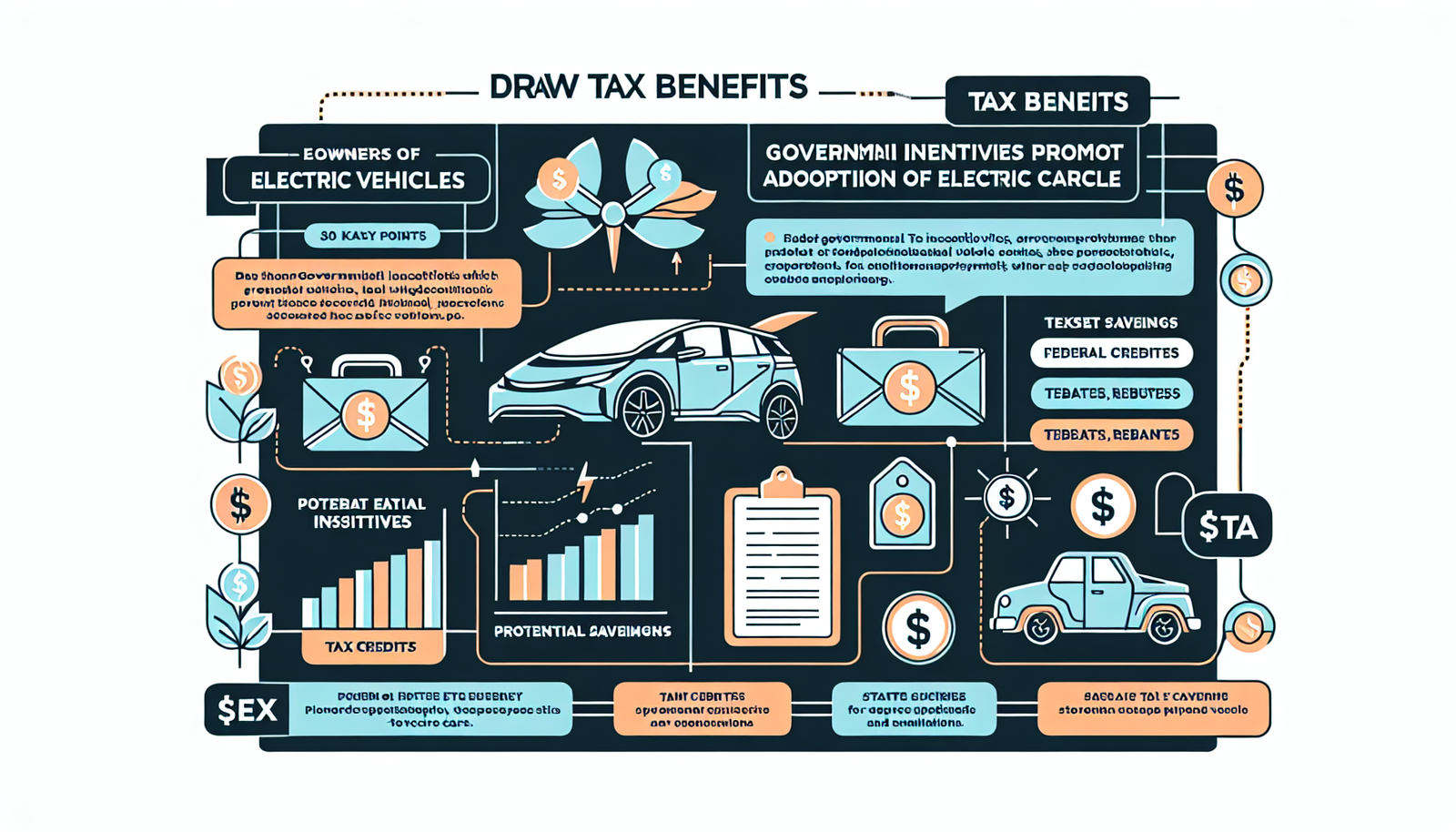Are you an electric vehicle owner curious about the potential tax benefits you can take advantage of? Look no further! In this article, we will explore the various tax benefits that are available specifically for electric vehicle owners. From federal tax credits to state incentives, you’ll gain a comprehensive understanding of the financial advantages that come with owning an electric vehicle. So sit back, relax, and let’s embark on this enlightening journey together!
Federal Tax Credits
Overview
As an electric vehicle (EV) owner, you may be eligible for various federal tax credits that can significantly reduce the overall cost of owning an EV. These tax credits are part of the government’s efforts to promote clean and sustainable transportation options.
Qualified Vehicles
To qualify for federal tax credits, your vehicle must meet certain criteria set by the Internal Revenue Service (IRS). Currently, only plug-in electric vehicles (PEVs) and certain hybrid vehicles are eligible for these credits. It’s important to check the IRS website or consult a tax professional for specific details on which vehicles qualify.
Credit Amount
The amount of the federal tax credit depends on the battery capacity of your EV. Typically, the larger the battery capacity, the higher the credit amount. The maximum credit amount available for EV owners is $7,500, but this can vary depending on the specific vehicle model and battery size. It’s worth noting that the federal tax credit is non-refundable, which means it can only be used to offset your tax liability.
Limitations and Phase Out
It’s important to keep in mind that federal tax credits for EVs are subject to certain limitations and phase-out rules. Once an automaker reaches a certain sales threshold of EVs, the tax credits for that specific automaker’s vehicles begin to phase out. This means that the credit amount for their vehicles gradually decreases over time. Therefore, it’s advisable to check the current status of the tax credit for the particular make and model of EV you are interested in.
State and Local Incentives
State-level Incentives
In addition to federal tax credits, many states offer their own incentives to encourage the adoption of electric vehicles. These incentives can vary widely depending on the state and may include additional tax credits, rebates, or grants. Some states even offer free or discounted charging station installation. To find out which incentives are available in your state, you can visit the Database of State Incentives for Renewables and Efficiency (DSIRE) website.
Local Incentives
Apart from state-level incentives, some local municipalities and utility companies also provide incentives specifically tailored to electric vehicle owners. These incentives can range from free or discounted charging station installation to reduced electricity rates for EV charging. It’s worth exploring the incentives offered by your local government and utility companies to maximize the benefits of owning an electric vehicle.

Income Tax Credits and Deductions
Federal Income Tax Credits
In addition to the federal tax credits mentioned earlier, electric vehicle owners may be eligible for certain federal income tax credits. For example, you may be able to claim a credit for the installation of charging infrastructure at your residence or business. These credits can help offset the upfront cost of installing EV charging equipment.
State Income Tax Credits
Some states also offer income tax credits for EV owners. These credits can further reduce your tax liability and provide additional savings. Similar to the federal credits, it’s essential to consult the specific regulations of your state to determine if you qualify for these income tax credits.
Deductions for Charging Infrastructure Installation
Aside from tax credits, you may also be able to deduct the cost of installing charging infrastructure for your electric vehicle on your federal or state income tax returns. This deduction can help lower your taxable income, resulting in reduced tax liability. Again, it’s advisable to consult with a tax professional or review the IRS guidelines to determine the eligibility and limitations of these deductions.
Sales Tax Exemptions
Overview
Sales tax exemptions are another form of financial incentive available to electric vehicle owners. These exemptions allow you to purchase your EV without paying the usual sales tax at the time of purchase, potentially saving you hundreds or even thousands of dollars.
States with Sales Tax Exemptions
Several states currently offer sales tax exemptions for electric vehicles. These states include California, New York, Colorado, and many others. However, it’s essential to note that the availability and terms of these exemptions can vary by state. It’s recommended to research the specific regulations in your state or consult with local authorities to determine if you qualify for this incentive.

Property Tax Exemptions
Overview
In addition to sales tax exemptions, some states also provide property tax exemptions for electric vehicle owners. These exemptions are designed to incentivize the adoption of clean transportation options and can provide long-term financial benefits.
States with Property Tax Exemptions
States such as California, Oregon, and Illinois offer property tax exemptions for electric vehicles. These exemptions typically waive property taxes on the value of the EV, which can result in significant savings over the life of the vehicle. As with other incentives, it’s important to research the specific regulations in your state to determine if you’re eligible for this benefit.
Fuel Tax Credits and Exemptions
Income Tax Credits for Alternative Fuel Use
Alongside the various tax credits mentioned above, some jurisdictions provide income tax credits for using alternative fuels, including electricity for electric vehicles. These credits can be claimed in addition to the federal and state tax credits for EV ownership.
Fuel Tax Exemptions for EVs
Additionally, electric vehicle owners are generally exempt from paying fuel taxes because EVs do not require traditional gasoline or diesel. This exemption further reduces the cost of owning and operating an electric vehicle, as you won’t have to pay the usual taxes levied on fossil fuel consumption.
HOV Lane Access
Overview
One of the perks of owning an electric vehicle is gaining access to High Occupancy Vehicle (HOV) lanes, which often provide faster and more efficient routes during peak traffic hours. This access can significantly reduce commuting times and make driving an EV even more attractive.
Eligibility and Requirements
The specific eligibility criteria and requirements for accessing HOV lanes as an electric vehicle owner vary from state to state. Some states require a special license plate or decal displaying your EV status, while others require a minimum number of occupants. It’s crucial to understand your state’s regulations and obtain the necessary documentation to take advantage of this benefit.
States with HOV Lane Access
States such as California, New York, and Georgia are among those that grant electric vehicle owners HOV lane access. However, it’s important to note that policies can change, and the availability of this benefit may vary over time. Stay informed about the current regulations in your state to ensure you can enjoy the advantages of HOV lane access.
Charging Infrastructure Incentives
Overview
To support the widespread adoption of electric vehicles, both the federal government and various states and local municipalities offer incentives to promote the installation of charging infrastructure. These incentives aim to make it easier for EV owners to access convenient and reliable charging options.
Federal Grants and Funding
The federal government provides grants and funding opportunities to support the development of charging infrastructure. These grants can be accessed by businesses, local governments, and other eligible organizations to facilitate the installation of charging stations in strategic locations.
State and Local Incentives
Many states and local municipalities also offer incentives for the installation of charging infrastructure. These incentives can include grants, rebates, or tax credits that help offset the costs associated with purchasing and installing charging equipment. By taking advantage of these incentives, individuals and businesses can contribute to the growth of the charging infrastructure network and make electric vehicle ownership more feasible for everyone.
Business Tax Incentives
Depreciation and Expensing
Businesses that acquire electric vehicles can benefit from various tax incentives related to depreciation and expensing. The IRS allows businesses to depreciate the value of an electric vehicle over a set period, resulting in significant tax deductions. Additionally, businesses may be eligible to expense a portion or the entire cost of an electric vehicle in the year it is placed in service, further reducing their tax liability.
Federal Tax Credits for Businesses
Similar to individual tax credits, there are federal tax credits available for businesses that own or lease electric vehicles. The credit amount varies depending on the vehicle’s battery capacity and can provide substantial savings for businesses investing in electric vehicles as part of their fleet.
State and Local Incentives for Businesses
Many states and local entities offer additional incentives specifically targeted at businesses that choose to incorporate electric vehicles into their fleet. These incentives can include grants, tax credits, or other forms of financial support. By taking advantage of these incentives, businesses can not only reduce their operating costs but also contribute to a more sustainable future.
Additional Benefits and Considerations
Reduced Maintenance and Operating Costs
Electric vehicles generally have lower maintenance and operating costs compared to traditional gasoline-powered vehicles. EVs have fewer moving parts and don’t require oil changes or regular tune-ups. Additionally, electricity is often cheaper than gasoline, resulting in lower fuel costs for EV owners. Over time, these savings can add up and make owning an electric vehicle more financially advantageous.
Environmental Benefits
The environmental benefits of owning an electric vehicle cannot be overstated. By driving an EV, you are reducing greenhouse gas emissions and contributing to cleaner air quality. EVs produce zero tailpipe emissions, helping to combat climate change and improve public health. Choosing an electric vehicle is a powerful way to make a positive impact on the environment.
Residential Solar Incentives and Integration
If you have a residential solar power system, owning an electric vehicle can be even more beneficial. Some states offer incentives for homeowners who install solar panels, which can help offset the cost of charging your electric vehicle. By integrating these two technologies, you can further reduce your carbon footprint and maximize the financial benefits of going solar and owning an EV.
In conclusion, as an electric vehicle owner, you have access to a wide range of tax benefits and incentives at both the federal and state levels. These incentives can significantly reduce the cost of owning and operating an electric vehicle, making it a more attractive option for many individuals and businesses. From federal tax credits to sales tax exemptions and HOV lane access, there are numerous ways to save money and contribute to a more sustainable future through electric vehicle ownership. Remember to stay informed about the specific regulations and incentives in your state and consult with a tax professional for personalized advice on maximizing your savings.

